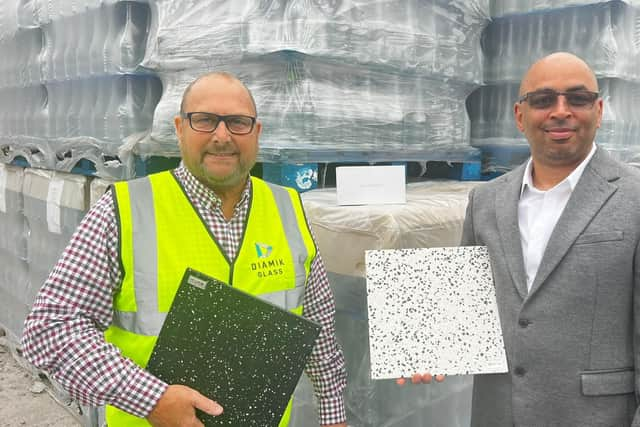Meet the entrepreneur who is making office worktops out of old glass bottles and windows
Recycling and reusing material from older buildings is becoming more common and boosting business for small, niche businesses like Diamik Glass, which creates surfaces from recycled glass .
When Meadowhall owner British Land decided to revamp its London headquarters, it called on the Leeds-based business to recycle some of its old windows and turn them into surfaces for its washrooms, meeting rooms and catering areas.
Advertisement
Hide AdAdvertisement
Hide AdThe company is also working with refurbishment specialist Ambit Moat to turn hundreds of windows that no longer meet current standards at a seven-storey office building on Farringdon Road in London into work surfaces and decorative wall panels.


Meanwhile, Bombay Sapphire recently sent Diamik thousands of bottles to process into tables for its visitor centre cafe and cinema.
"We are seeing more and more demand from clients who are refurbishing and want to use reuse materials from their buildings,” says Diamik managing director Michael Pickup, known as Mick.
Pickup founded the business in 2019 after coming across a cottage industry that was fusing together coloured waste glass to produce decorative slabs.
Advertisement
Hide AdAdvertisement
Hide AdIt was a tenant at a building he owned, through a property investment firm he runs with his wife Diane, and he was fascinated with the concept.
"The business wasn’t commercial,” he says. “They couldn’t produce enough of the product quickly enough to make a profit. I went looking for alternative ways to use waste material to make high-end surfaces on a commercial scale.”
Through his research, Pickup found that US companies were using resin as a bonding agent, which was a gamechanger for manufacturing the product more quickly.
“That’s essentially what we do now,” he says. “I saw an opportunity to create a sustainable high-end product that could compete with mined products like marble, granite and quartz.”
Advertisement
Hide AdAdvertisement
Hide AdDiamik, which is a blend of Diane and Mick , usually receives the glass in bottle or pane form at no cost.
Eighty five per cent the end product, known as ecorok is waste glass. “It’s hugely sustainable. It can be recycled over and over again,” says Pickup.
Getting a start-up off the ground just before the start of the covid-19 pandemic was ‘very tough’, he says, because he couldn’t assemble a traditional factory environment and it was difficult to contact architects and designers, who might want to buy the product.
"We spent a lot of time developing the product and trying to resolve issues we didn’t know existed in the beginning. It wasn’t straightforward but with perseverance we’ve managed to overcome those issues,” Pickup adds.
Advertisement
Hide AdAdvertisement
Hide AdHe personally invested about £750,000 in the business. However, despite the initial setbacks, the company has steadily grown over the last four years to 11 employees and a turnover of £687,000.
Diamik’s client list includes some of the biggest names in business and education, having worked with Amex, Mastercard, Diageo, Legal & General, Cambridge University, HMRC, KPMG and Deloitte.
It has also made till screens for high-end grocer Fortnum & Mason’s chocolate emporium.
Domestic customers account for about 20 per cent of business. It is hoping to grow that side of the business by establishing partnerships with 24 local fabricators across the country who can shape and deliver the product to customers.
Advertisement
Hide AdAdvertisement
Hide AdDiamik’s current focus is to complete projects that have stalled or been slow to come to fruition in recent years.
"The reality is that the time frame for a commercial project can be four or five years,” Pickup says. “Covid took a big chunk of time out of that and projects that should have been happening now are not happening because of delays with Covid.”
Diamik recently invested £400,000 in large scale technical machinery. Its challenge now is to scale up the business to use the factory to its full potential and beyond. “We have to have the machinery even if we’re producing one worktop,” says Pickup.
He is also looking for further investment to grow the business and create a large scale manufacturing plant.
Advertisement
Hide AdAdvertisement
Hide Ad"There is no large scale slab manufacturing facility in the UK,” he says. “The sad reality is that everything that comes into people’s kitchens and offices in the UK is primarily imported.
"That has to stop. If we want to make things sustainable then the UK needs to have its own manufacturing facility and what could be better than manufacturing using waste materials?”
He adds: "We’ve done trials, we’ve invested in machinery to prove it can be done. The investment required to set up a full scale manufacturing facility in the UK would be somewhere in the region of £1.25m.
"With that facility a company like ourselves could produce somewhere in the region of £25m worth of raw material a year and that would be very profitable and that plant would essentially pay for itself within the first 18 months.
Advertisement
Hide AdAdvertisement
Hide Ad"In order to do that you need investors and you need commitment but the return on investment would be huge and that’s where we are at the moment.”
Pickup says a full-scale manufacturing plant would bring down the cost of the product, which is currently comparable to marble, granite and quartz.
"It would mean we could put our material into housing association homes and meet their price demands, which would be a huge success,” he adds. “If I can get to that then I will have achieved my lifetime goal.”